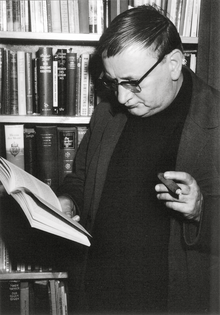Erwin Grosse
Erwin Grosse (born December 4, 1904 in Hanover , † March 4, 1982 in Ettlingen ) was a German composer .
Life
Erwin Grosse, born in Hanover in 1904 , began a career as an orchestral violinist in his youth after intensive musical studies. The other stations of his musical practice are varied: concert pianist, harpsichordist, violist, theater conductor and musical director of the ballet, theory, composition and piano teacher. Since 1954 Erwin Grosse has taught at the Baden Conservatory and at the Music Academy in Karlsruhe . From 1971 until his death in 1982 he lived in Ettlingen .
His practical musical complexity is reflected above all in the composition, his actual calling. A long way led from the beginnings in 1920 to the progressive and experimental works of the 60s and 70s. Coming from Max Reger's school of composition , he began with instrumental works in the late romantic style. There were piano, organ and orchestral works and a fantasy and fugue for large orchestra (1922)
The year 1925 brought a big change. As the musical director of the most modern ballet group in Germany at the time under Yvonne Georgi and Harald Kreutzberg in Hanover , Erwin Grosse learned the works of Igor Stravinsky , Béla Bartók , Paul Hindemith and also compositions by the French Groupe des Six and the Neue Know the Viennese School .
Under the influence of this then radically modern music, he changed his style.
In the years up to 1933 he produced a large number of important works, e. B. the dance suite for jazz band , the surrealist glosses , and a divertimento for orchestra .
After 1933 his composing activity was severely restricted.
In 1948 he tried a fresh start. He dealt with dodecaphonic (twelve-tone) and serial music . In a synthesis of all stylistic influences he developed his individual, compositional handwriting.
The outstanding compositions of this time include the women in the D-Zug , 10 miniatures op.36 , sonata in twelve-tone , trio seconds , and twelve trifles . In 1960 Erwin Grosse wrote his Chamber Symphony op.48 for a composition competition of German music publishers and received first prize from 80 international applicants. In the last years of his life, Erwin Grosse devoted himself increasingly to youth music and wrote some works for various larger ensembles consisting of recorders, stick playing and percussion.
He died on March 4, 1982 in Ettlingen .
Works (selection)
- 6 Preludes op.8a for piano (1927) (also other instrumentations) (temple dancers - march - puppet kasperl - Preludio da Chiesa - white dance - piano exercise)
- K7 (chamber music op.7) (1927) for piano, celesta, viola, clarinet B-flat and E-flat, tenor saxophone
- Divertimento for orchestra (1930)
- Ballet Suite op.12 (B 12) (1931)
- 10 miniatures for piano op.36 (1948) (melody - jazz - dance study - Spanish dance - pastoral - rondeau - portrait of a girl - humoresque - peasant dance - bicinium)
- Sonata for violin and piano op.37 (1948)
- Sonata in twelve tone op.46 for violoncello and piano (1949)
- Miniatures for orchestra op.36a (1953)
- Frauen im D-Zug for piano 4 hands (1954) (The blonde private secretary - The excited aunt Minna - The dashing sportswoman - The dark longing - And the one from ballet)
- Sonata for viola and piano op.41 (1954)
- Romance in 12 notes for piano (1958)
- Melody in E for piano (1959)
- On the Autobahn (piano piece with 7 reliefs) (1959)
- Jeanine , opera in 5 pictures. Text by Hugo Schöttle (1960–63)
- Trio-seconds op.50 for violin, violoncello and piano (1963/64)
- Variations op.52 for alto flute in G, viola and violoncello (1964)
- Four Segments, Op. 51 for flute and piano (1964)
- 2 pieces for 3 percussionists op.56 (1967)
- Trio for piano, violin and violoncello op.55 (1967)
- Quartforst op.54 (Quartet for Strings) (1967)
- Giuoco (Violin Concerto) op.58 (1968)
- Concertino for double bass op.64 (1970)
- Concert music for string orchestra op.62 (1970)
- Divertissement for wind instruments op.67 (1971)
- Octet for wind instruments op.74 (1979)
Sound carrier
- Erwin Grosse (1904-1982) Vol. 1-3 (3 cassettes with a representative selection of his works compiled by the composer himself in concert and radio recordings)
- Piano music from Karlsruhe composers , compiled and selected by Joachim Draheim (CD), including 10 miniatures op.36 for piano (interpreter: Sontraud Speidel)
- Karlsruhe music history , CD supplement (see below: Literature. Contains a selection of the miniatures op. 10, played by Sontraud Speidel)
- Erwin Grosse, piano music , (CD) (Performers: Heike Bleckmann, Lukas Schellinger)
- Concertante music for string orchestra op.62 , (CD) (performers: Barbara Burgdorf and Christoph Richard, violin, Florian Weigand, viola, Dominik Hörnel, cello, chamber orchestra of the University of Karlsruhe, conductor: Dieter Köhnlein)
literature
- Erwin Grosse, Story of a Musical Development 1904–1974 (with catalog raisonné), Ettlingen 1974
- Joachim Draheim: Karlsruher Musikgeschichte Info Verlagsges., Karlsruhe 2004, ISBN 978-3881903578
Web links
| personal data | |
|---|---|
| SURNAME | Grosse, Erwin |
| BRIEF DESCRIPTION | German composer |
| DATE OF BIRTH | 4th December 1904 |
| PLACE OF BIRTH | Hanover |
| DATE OF DEATH | March 4th 1982 |
| Place of death | Ettlingen |
